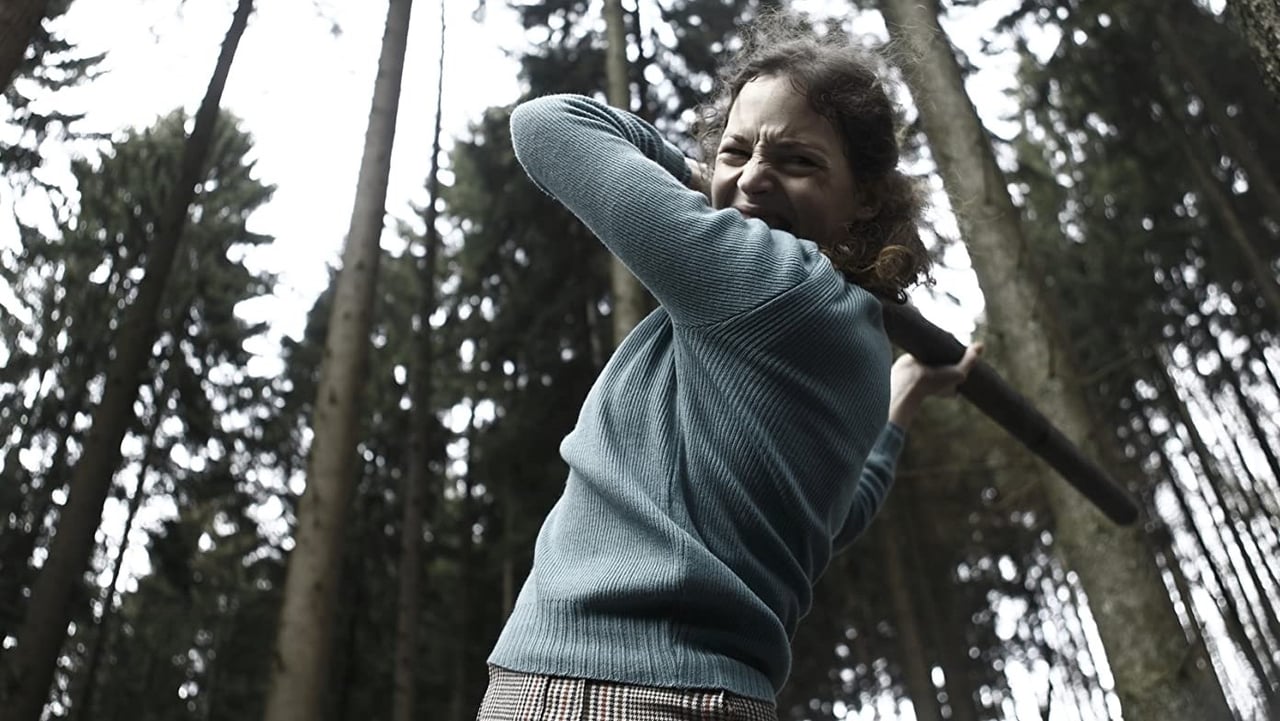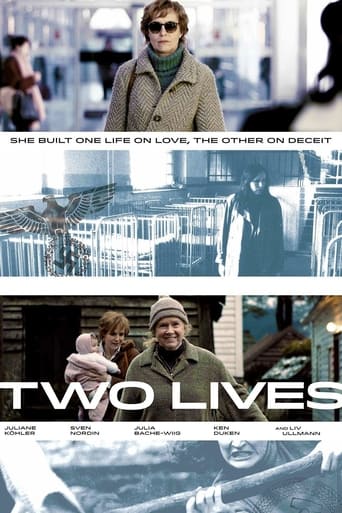

Absolutely Fantastic
... View MoreA Disappointing Continuation
... View Moren my opinion it was a great movie with some interesting elements, even though having some plot holes and the ending probably was just too messy and crammed together, but still fun to watch and not your casual movie that is similar to all other ones.
... View Morea film so unique, intoxicating and bizarre that it not only demands another viewing, but is also forgivable as a satirical comedy where the jokes eventually take the back seat.
... View MoreTo understand the plot in "Two Lives", perhaps a bit of a history lesson is in order. Back during WWII, the Nazis wanted to greatly increase the number of Aryans and in order to do so they created the 'Lebensborn' program. It was a series of maternity centers for young mothers and German soldiers were encouraged to impregnate good Aryan girls--both Germans, Norwegians and other 'acceptable' ethnic groups. Marriage was not a major concern...they just wanted babies..healthy Nordic looking babies for the Third Reich. In essence, these were state sponsored baby mills and the children were taken from their mothers to be raised by the state.The story picks up around the time of the fall of the Berlin Wall in 1990. A young Norwegian lawyer has just approached Katrine (Juliane Köhler) about a lawsuit. It seems that Katrine and her mother are unique in that although her mother, Ase (Liv Ullman), was part of the Lebensborn program since she had married a German soldier and had a baby by him, she was unique because well after the war she is one of the only mothers who eventually found her child after she'd been forcibly taken by the Nazis. It seems that Katrine escaped communist East Germany as a young adult and eventually was reunited with her mother in Norway. Yet, inexplicably, many years later, Katrine is angry and wants nothing to do with this quest for justice...even though her mother is more than willing to cooperate. Why does Katrine demand secrecy and why does she go to Germany to destroy some of the Lebensborn records? Could Katrine actually be someone other than Ase's daughter? And, if so, why did she assume this woman's identity?The most amazing thing about this film is that it's based on actual cases...cases where duplicates were sent back into Norway...duplicates which claimed to be children from the Lebensborn who were returning to their mothers! Overall, a fascinating and well made film--one that is well worth seeing and profoundly interesting as well as sad.
... View MoreIn Norway, Katrine Evensen Myrdal (Juliane Köhler) is a middle-aged woman happily married with Navy Commander Bjarte Myrdal (Sven Nordin). Katrine loves her daughter Anne (Julia Bache-Wiig) that is a single mother; her granddaughter Turid; and her mother Ase Evensen (Liv Ullmann) that helps Anne to raise Turid. Katrine's father was a German occupation soldier during the World War II and Katrine was taken by the German government and raised in the Sachsen Orphanage in East Germany. At the age of 20, Katrine escapes from East Germany and comes to Norway to meet her mother. In November 1990, after the fall of the Berlin Wall, the German lawyer Sven Solbach (Ken Duken) seeks Katrine and her mother out to give the testimony in a trial against the Norwegian state on behalf of the war children. Katrine refuses to testify, but Ase accepts and turns the life of her daughter upside-down when Sven discloses hidden dark secrets from her life. "Zwei Leben" is a spectacular German-Norwegian film with a credible story of espionage, drama, love and thriller based on true events unknown for great part of the world. The screenplay is very well written, disclosing the truth about the mysterious Katrine through flashbacks like a puzzle. The performances are top-notch, highlighting the fantastic German actress Juliane Köhler from "Aimée & Jaguar", "Nowhere in Africa" and "Downfall" among other great movies. It is different to see Liv Ullmann an old lady after so many movies by Ingmar Bergman. In the end, "Zwei Lebe" is a highly recommended movie with an engaging sad story. My vote is nine.Title (Brazil): "Duas Vidas" ("Two Lives")
... View MoreGerman screenwriter, film editor and director Georg Maas' second feature film which he co-directed with German screenwriter and cinematographer Judith Kaufmann and co-wrote with her and screenwriters Ståle Stein Nilsen and Christoph Tölle, is inspired by a novel called "Eiszeiten" by German author and journalist Hannelore Hippe. It premiered in Norway, was shot on locations in Norway and Germany and is a Germany-Norway co-production which was produced by producers Dieter Zeppenfeld, Axel Helgeland and Rudi Teichmann. It tells the story about a middle-aged woman named Katrine Myrdal who lives in a house near the coast in Bergen, Norway with her husband named Bjarte whom is in the Navy and their adult daughter named Anne whom is living there with her new-born daughter named Turid. Sometime after receiving a call from her mother named Åse Evensen whom is picked up at her house by Bjarte and Anne and brought to their home, Katrine is contacted by a German attorney named Solbach whom has knowledge about her history and who asks her to testify in a trial against the Norwegian Government. Subtly and engagingly directed by German filmmaker Georg Maas, this finely paced and somewhat fictional tale which is narrated from multiple viewpoints though mostly from the protagonist's point of view, draws a multifaceted and involving portrayal of a Norwegian citizen of German origins whom whilst looking for a nurse named Hiltrud Schlömer who used to work at an orphanage in Sachsenhausen, Germany during the Second World War meets a person who reminds her of her true identity. While notable for its naturalistic and atmospheric milieu depictions, sterling cinematography by German cinematographer Judith Kaufmann and fine production design by production designer Bader El Hindi and costume design by costume designer Ute Paffendorf, this character-driven and narrative-driven about the criminal SS organization called Lebensborn which was founded by the German Reichführer of the Schutzstaffel Heinrich Himmler (1900-1945) in Germany in the mid-1930s for the sake of realizing the Aryan visions of the Austrian-born Chancellor of Germany Adolf Hitler (1889-1945), which was prominent in occupied Norway (1940-1945), which focuses on some of those "many" children who were born, in this particular case, by Norwegian mothers who had been in extramarital relations with German SS members during World War II and the ostracizing treatment of these children and women in post-war Norway, depicts a refined study of character and contains a timely score by composers Christoph M. Kaiser and Julian Maas. This historic, atmospheric, modestly romantic and conversational drama which has been chosen as Germany's official submission to the Academy Award for Best Foreign Language Film at the 86th Academy Awards in 2014, which is set mostly in Norway and Germany in the late 1960s and early 1990s and where a daughter whom is considering to begin studying law meets a man whom is searching for information about her mother and a woman who suffered the consequences of her Nazi countrymen's disgraceful experiments on human lives is reunited with the men who recruited her, is impelled and reinforced by its fragmented narrative structure, substantial character development, efficient continuity, variegated characters, gripping flashback scenes, comment by Bjarte : "What is the truth?", the reverent and understated acting performances by German actress Juliane Köhler, Norwegian actor Sven Nordin, Norwegian actress Julia Bache-Wiig, German actress Klara Manzel and the noteworthy acting performance by Norwegian actress, screenwriter and director Liv Ullmann. An unsettling, heartrending and poignant thriller.
... View MoreDirector Georg Maas and co-director Judith Kaufmann are far from big names in the movie industry, even here in Germany. So I was a bit surprised when their most recent project "Zwei Leben" ("Two Lives") was selected as the official submission to the Academy for this year's foreign language Oscar instead of "Oh Boy", the big winner from this year's national film awards. After watching "Zwei Leben" the other day, I can totally see why. Apart from Köhler's excellent performance, statistics are on her side as well. In the last 15 years several films starring her as a lead character made quite some waves abroad. "Aimée & Jaguar" managed a foreign language nomination at the Golden Globes, "Downfall", in which she played the Eva Braun to Bruno Ganz' Adolf Hitler was Oscar-nominated and Nowhere in Africa even won the Foreign Language Oscar ten years ago. Could this be her next coup?We get to see flashbacks, but most of the film takes place in 1990, right after the fall of the Berlin Wall and illustrates besides the personal fate of the central character and everybody close to her, also the historic phenomenon of the "Lebensborn"-generation. This describes Aryan-looking children from German-occupied areas during World War II who were abducted to Germany for breeding purposes. When the War ended, many of these were on their own trying to make it back home and did not make it. Köhler does not play one of these children. She plays a Stasi informant who was planted in Norway for spying purposes and assumed the identity of Katrine Evensen, one of the aforementioned "Lebensborn"-children. At first, there was nobody but her mother, but not much later she marries under her new identity and gives birth to a daughter. Decades later she is still living the family life under her wrong identity. However, a recent investigation on possible compensation for the "Lebensborn"-children makes her facade crumble more and more, while we find out what happened to the real Katrine Evensen.This film is a thrill-ride for over 90 minutes as well as an important history lesson on an issue which is not really known to many. I remember our curricula at school packed with material about the Nazis and World War II, but I'm surprised this was never included at all. It's shaping up to be an interesting year for the foreign language Oscar. The Saudi-Arabian entry is nothing short of magnificent either and if Denmark submits Mikkelsen's "Jagten", it could be one of the best group of nominees in years. Anyway, back to "Zwei Leben", besides Köhler's great work, also almost the whole supporting cast delivers convincing portrayals. Multiple Oscar-nominee Liv Ullmann is back after a break of many years and nails her scenes just like Nordin, Bache-Wiig and the duo of actors who portray the GDR-shadows from the past coming back to haunt Köhler's character. If there is anything I would criticize it was Ken Duken's portrayal. I've seen quite a few of his works and I just don't think he's a great actor at all, sadly. I'm yet to see a performance where he really becomes the character, just like the ladies do in this one, and the thick beard he spots in this one can't convince me. But that's really just a very minor deduction. I recommend this film a lot, not only to Norwegians and Germans, but also to everybody else. It's a deeply moving piece highlighted by Juliane Köhler's multi-layered portrayal of a victim-offender character and I truly hope it can make the nomination.
... View More